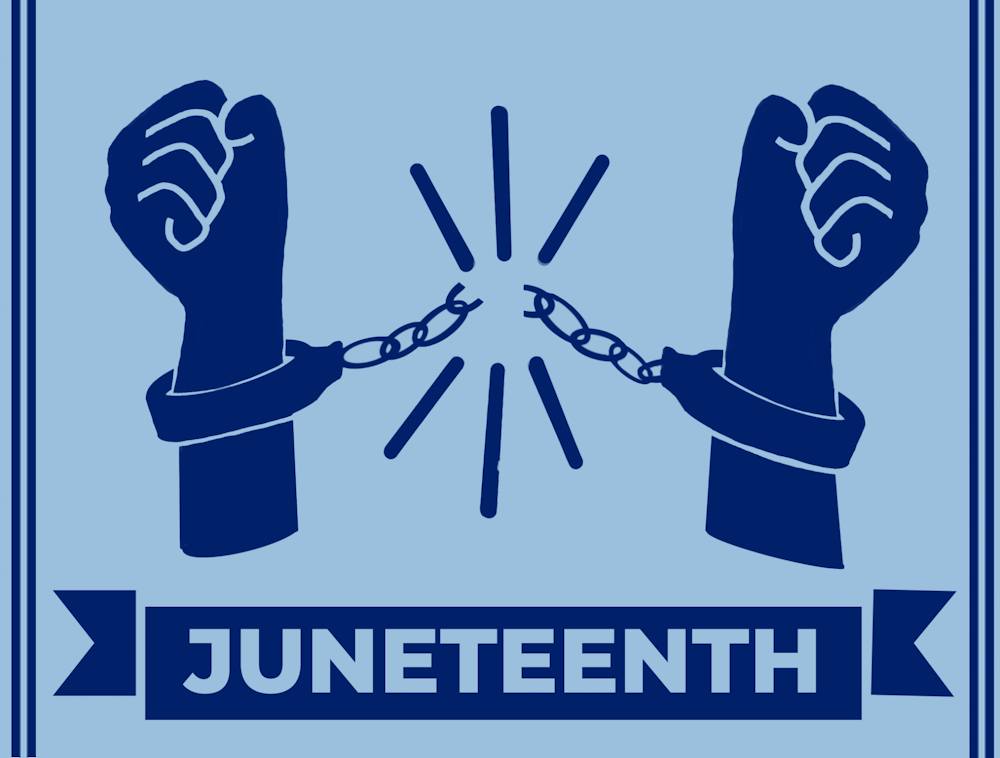While the world works together to achieve social justice and equality for Black people through protests, Juneteenth, the day celebrated as the end to slavery, is approaching.
Juneteenth, or June 19, 1865, was the day the 13th Amendment garnered enough votes in the House to pass the amendment to end slavery; however, the official abolishment of slavery was not until December 1865, when it approached the requirement of two-thirds of the states to ratify the movement.
“We could view June 1865 to December 1865 as a mixed bag, one of jubilee and uncertainty, for Black people,” Bayyinah S. Jeffries, an associate professor in the Department of African American studies at Ohio University, said in an email. “Besides, not all states supported the end to slavery; Mississippi officially ratifying the 13th amendment in 2013. All of these historical nuances are important to acknowledge alongside the celebration.”
Although 1865 marked the end to slavery, Black people, to this day, have continued to be treated unfairly and unequally. The most well-known system that mistreats and racially profiles Black people is law enforcement. According to the NAACP, Black Americans are incarcerated at more than five times the rate of white people. Not only is mass incarceration of Black Americans an issue, but also the number of police killings Black people face.
According to Mohammed Haddad at Aljazeera, “Despite only making up 13 percent of the US population, Black Americans are two-and-a-half times as likely as white Americans to be killed by the police.”
One of the most remembered instances of police brutality is the case of Rodney King, a Black man who was beaten by Los Angeles Police Department officers in 1991. Since 2012, the deaths of Black Americans by police have gained massive publicity and influenced protests fighting for racially equal treatment to citizens by police.
Jeffries said the new legislation, the Justice in Policing Act, which is out of step with events that sparked the murders of Trayvon Martin, Rekia Boyd and Shereese Francis, leaves too much unaddressed. The recent murders of George Floyd, Breonna Taylor and Ahmaud Arbery by police officers and white vigilantes have led to a rise in attention for the Black Lives Matter movement.
“It does not incorporate the systemic racism that corrupts and permeates every level of American society, much like the previous systems of chattel slavery and Jim Crow,” Jeffries said in an email.
Although it may be the most significant, police brutality is not the only aspect of adversity Black people face. They experience poor treatment in other systems, such as health care, education, political polls and the workforce. This poor treatment is even evident in shopping, as many stores lock up products used solely by Black people behind clear barriers, so they have to ask workers to open the barrier for everyday items, like hair products.
“According to the National Urban league annual report, voter suppression, health disparities, and over-policing continue to be a problem for African Americans,” Akil Houston, an associate professor of the Department of African American studies at OU, said in an email. “I would add for Black LGBTQ people there are some real concerns. In 2020 alone 114 Black trans or gender non-conforming people have been killed.”
Although white people have not known much information about the history of Juneteenth or celebrated the holiday, Black people have long celebrated the day. The education system does not put a lot of focus on Juneteenth, so many people outside of the Black Community do not understand the significance or the history of the day.
“As for schools, any education that deals in invisibility, marginalization, falsification, revision, and/or devaluing of African American history is not an education worth pursuing,” Jeffries said in an email. “There is no academic discipline, field-of-study, or American event held in esteem that Black people have not played an important role or been cast as major actors.”
The education system has led many Americans to believe that slavery ended in January 1863 with the Emancipation Proclamation, but Abraham Lincoln did not make it a necessity for anyone to tell the freed people they were no longer tied to their owners. Jeffries said it is important to understand the facts, which include the fact that slavery actually ended in December 1865, when 27 out of 36 states ratified the end of slavery in the U.S.
“The Proclamation didn't necessarily free people,” Houston said in an email. “Congress passed the Second Confiscation Act 17 July 1862, the first emancipation proclamation. This gets signed into law six months before the signing of the Emancipation Proclamation. The Second Confiscation Act defined rebels as traitors, provided for the confiscation of property, and freed the enslaved of rebels. It is the 13th Amendment, Abolitionists, and the Confiscation Acts where these freedoms take shape.”
Jeffries said Juneteenth is recognized as a holiday to 46 of the 50 states in America, and in 2019, the Senate created a resolution for the federal recognition of Juneteenth as a holiday, but it did not pass in the House.
Houston said Juneteenth has not been recognized as a federal holiday because the nation has not reconciled its past, and it is difficult to make it a national holiday when many Americans are unaware of its history and significance. There is hope that the rise in interest and self-education of Black history by many people will lead more people to push for the holiday to be recognized federally.






